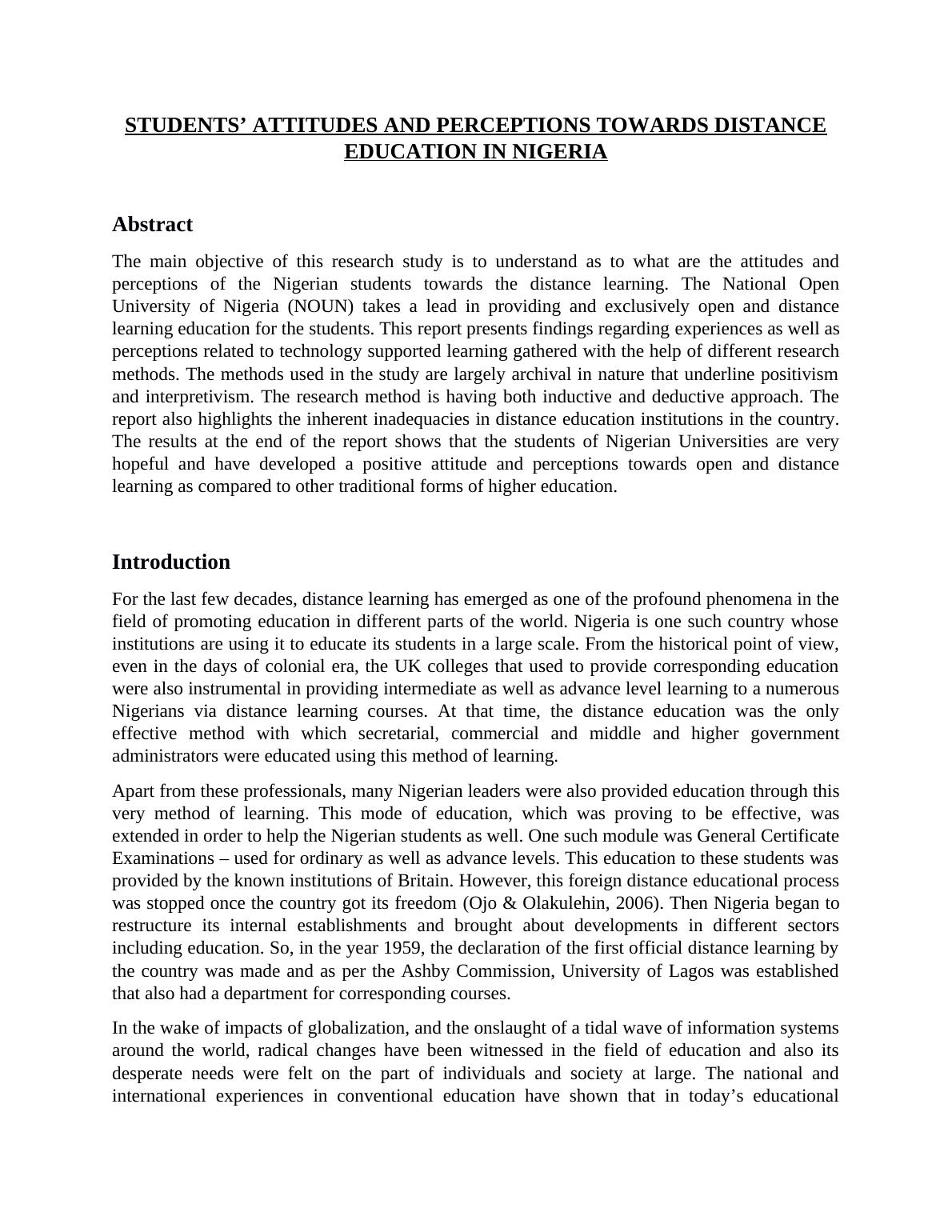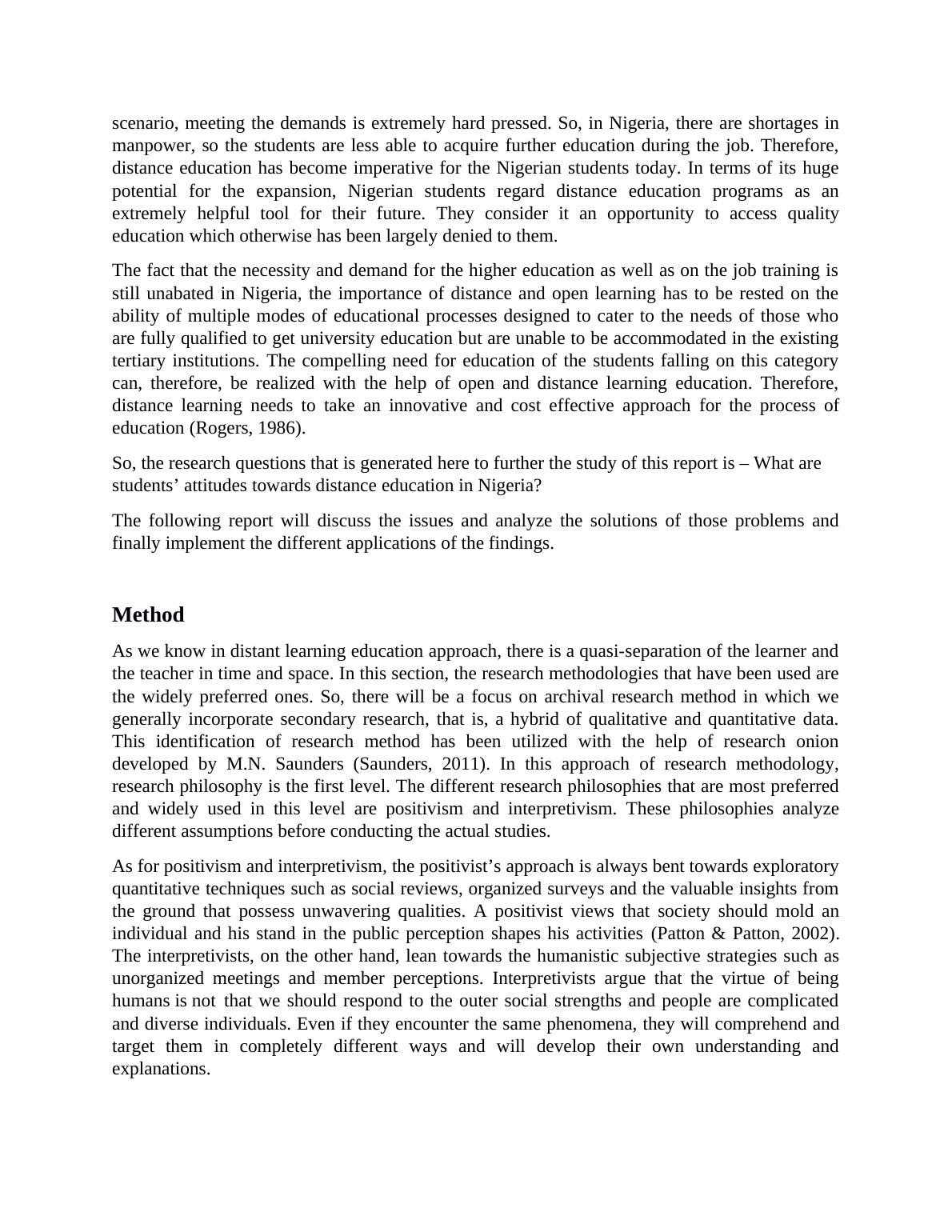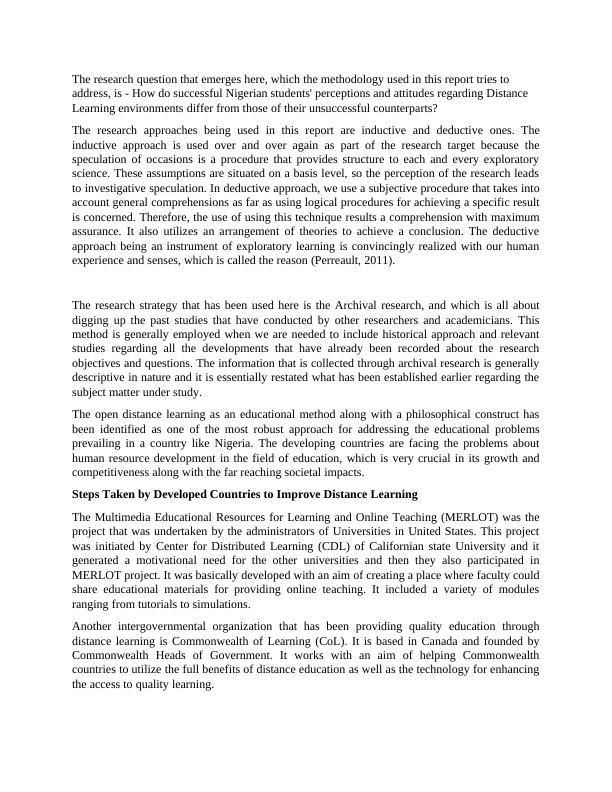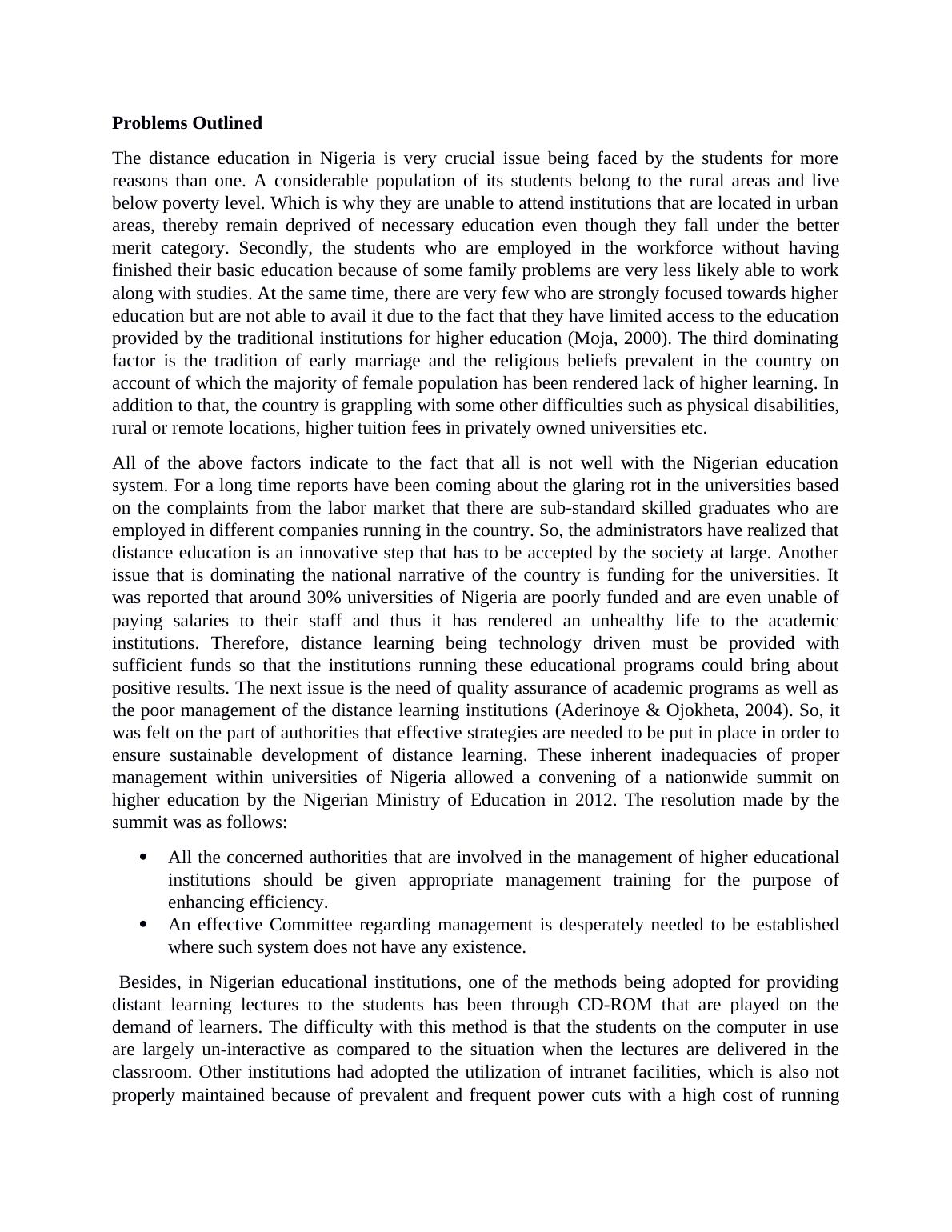Ask a question from expert
Students’ Attitudes and Perceptions towards Distance Education in Nigeria
11 Pages5429 Words447 Views
Added on 2019-09-23
About This Document
This research study aims to understand the attitudes and perceptions of Nigerian students towards distance learning. The report presents findings related to technology-supported learning and highlights the inadequacies in distance education institutions in the country. The report also discusses the steps taken by developed countries to improve distance learning and the problems faced by Nigerian students in accessing higher education. The National Open University of Nigeria (NOUN) is discussed as a pioneer in promoting distance education in the country.
Students’ Attitudes and Perceptions towards Distance Education in Nigeria
Added on 2019-09-23
BookmarkShareRelated Documents
STUDENTS’ ATTITUDES AND PERCEPTIONS TOWARDS DISTANCEEDUCATION IN NIGERIAAbstractThe main objective of this research study is to understand as to what are the attitudes andperceptions of the Nigerian students towards the distance learning. The National OpenUniversity of Nigeria (NOUN) takes a lead in providing and exclusively open and distancelearning education for the students. This report presents findings regarding experiences as well asperceptions related to technology supported learning gathered with the help of different researchmethods. The methods used in the study are largely archival in nature that underline positivismand interpretivism. The research method is having both inductive and deductive approach. Thereport also highlights the inherent inadequacies in distance education institutions in the country.The results at the end of the report shows that the students of Nigerian Universities are veryhopeful and have developed a positive attitude and perceptions towards open and distancelearning as compared to other traditional forms of higher education. IntroductionFor the last few decades, distance learning has emerged as one of the profound phenomena in thefield of promoting education in different parts of the world. Nigeria is one such country whoseinstitutions are using it to educate its students in a large scale. From the historical point of view,even in the days of colonial era, the UK colleges that used to provide corresponding educationwere also instrumental in providing intermediate as well as advance level learning to a numerousNigerians via distance learning courses. At that time, the distance education was the onlyeffective method with which secretarial, commercial and middle and higher governmentadministrators were educated using this method of learning. Apart from these professionals, many Nigerian leaders were also provided education through thisvery method of learning. This mode of education, which was proving to be effective, wasextended in order to help the Nigerian students as well. One such module was General CertificateExaminations – used for ordinary as well as advance levels. This education to these students wasprovided by the known institutions of Britain. However, this foreign distance educational processwas stopped once the country got its freedom (Ojo & Olakulehin, 2006). Then Nigeria began torestructure its internal establishments and brought about developments in different sectorsincluding education. So, in the year 1959, the declaration of the first official distance learning bythe country was made and as per the Ashby Commission, University of Lagos was establishedthat also had a department for corresponding courses.In the wake of impacts of globalization, and the onslaught of a tidal wave of information systemsaround the world, radical changes have been witnessed in the field of education and also itsdesperate needs were felt on the part of individuals and society at large. The national andinternational experiences in conventional education have shown that in today’s educational

scenario, meeting the demands is extremely hard pressed. So, in Nigeria, there are shortages inmanpower, so the students are less able to acquire further education during the job. Therefore,distance education has become imperative for the Nigerian students today. In terms of its hugepotential for the expansion, Nigerian students regard distance education programs as anextremely helpful tool for their future. They consider it an opportunity to access qualityeducation which otherwise has been largely denied to them. The fact that the necessity and demand for the higher education as well as on the job training isstill unabated in Nigeria, the importance of distance and open learning has to be rested on theability of multiple modes of educational processes designed to cater to the needs of those whoare fully qualified to get university education but are unable to be accommodated in the existingtertiary institutions. The compelling need for education of the students falling on this categorycan, therefore, be realized with the help of open and distance learning education. Therefore,distance learning needs to take an innovative and cost effective approach for the process ofeducation (Rogers, 1986). So, the research questions that is generated here to further the study of this report is – What are students’ attitudes towards distance education in Nigeria?The following report will discuss the issues and analyze the solutions of those problems andfinally implement the different applications of the findings.MethodAs we know in distant learning education approach, there is a quasi-separation of the learner andthe teacher in time and space. In this section, the research methodologies that have been used arethe widely preferred ones. So, there will be a focus on archival research method in which wegenerally incorporate secondary research, that is, a hybrid of qualitative and quantitative data.This identification of research method has been utilized with the help of research oniondeveloped by M.N. Saunders (Saunders, 2011). In this approach of research methodology,research philosophy is the first level. The different research philosophies that are most preferredand widely used in this level are positivism and interpretivism. These philosophies analyzedifferent assumptions before conducting the actual studies. As for positivism and interpretivism, the positivist’s approach is always bent towards exploratoryquantitative techniques such as social reviews, organized surveys and the valuable insights fromthe ground that possess unwavering qualities. A positivist views that society should mold anindividual and his stand in the public perception shapes his activities (Patton & Patton, 2002).The interpretivists, on the other hand, lean towards the humanistic subjective strategies such asunorganized meetings and member perceptions. Interpretivists argue that the virtue of beinghumans is not that we should respond to the outer social strengths and people are complicatedand diverse individuals. Even if they encounter the same phenomena, they will comprehend andtarget them in completely different ways and will develop their own understanding andexplanations.

The research question that emerges here, which the methodology used in this report tries to address, is - How do successful Nigerian students' perceptions and attitudes regarding Distance Learning environments differ from those of their unsuccessful counterparts?The research approaches being used in this report are inductive and deductive ones. Theinductive approach is used over and over again as part of the research target because thespeculation of occasions is a procedure that provides structure to each and every exploratoryscience. These assumptions are situated on a basis level, so the perception of the research leadsto investigative speculation. In deductive approach, we use a subjective procedure that takes intoaccount general comprehensions as far as using logical procedures for achieving a specific resultis concerned. Therefore, the use of using this technique results a comprehension with maximumassurance. It also utilizes an arrangement of theories to achieve a conclusion. The deductiveapproach being an instrument of exploratory learning is convincingly realized with our humanexperience and senses, which is called the reason (Perreault, 2011).The research strategy that has been used here is the Archival research, and which is all aboutdigging up the past studies that have conducted by other researchers and academicians. Thismethod is generally employed when we are needed to include historical approach and relevantstudies regarding all the developments that have already been recorded about the researchobjectives and questions. The information that is collected through archival research is generallydescriptive in nature and it is essentially restated what has been established earlier regarding thesubject matter under study. The open distance learning as an educational method along with a philosophical construct hasbeen identified as one of the most robust approach for addressing the educational problemsprevailing in a country like Nigeria. The developing countries are facing the problems abouthuman resource development in the field of education, which is very crucial in its growth andcompetitiveness along with the far reaching societal impacts. Steps Taken by Developed Countries to Improve Distance LearningThe Multimedia Educational Resources for Learning and Online Teaching (MERLOT) was theproject that was undertaken by the administrators of Universities in United States. This projectwas initiated by Center for Distributed Learning (CDL) of Californian state University and itgenerated a motivational need for the other universities and then they also participated inMERLOT project. It was basically developed with an aim of creating a place where faculty couldshare educational materials for providing online teaching. It included a variety of modulesranging from tutorials to simulations.Another intergovernmental organization that has been providing quality education throughdistance learning is Commonwealth of Learning (CoL). It is based in Canada and founded byCommonwealth Heads of Government. It works with an aim of helping Commonwealthcountries to utilize the full benefits of distance education as well as the technology for enhancingthe access to quality learning.

Problems OutlinedThe distance education in Nigeria is very crucial issue being faced by the students for morereasons than one. A considerable population of its students belong to the rural areas and livebelow poverty level. Which is why they are unable to attend institutions that are located in urbanareas, thereby remain deprived of necessary education even though they fall under the bettermerit category. Secondly, the students who are employed in the workforce without havingfinished their basic education because of some family problems are very less likely able to workalong with studies. At the same time, there are very few who are strongly focused towards highereducation but are not able to avail it due to the fact that they have limited access to the educationprovided by the traditional institutions for higher education (Moja, 2000). The third dominatingfactor is the tradition of early marriage and the religious beliefs prevalent in the country onaccount of which the majority of female population has been rendered lack of higher learning. Inaddition to that, the country is grappling with some other difficulties such as physical disabilities,rural or remote locations, higher tuition fees in privately owned universities etc. All of the above factors indicate to the fact that all is not well with the Nigerian educationsystem. For a long time reports have been coming about the glaring rot in the universities basedon the complaints from the labor market that there are sub-standard skilled graduates who areemployed in different companies running in the country. So, the administrators have realized thatdistance education is an innovative step that has to be accepted by the society at large. Anotherissue that is dominating the national narrative of the country is funding for the universities. Itwas reported that around 30% universities of Nigeria are poorly funded and are even unable ofpaying salaries to their staff and thus it has rendered an unhealthy life to the academicinstitutions. Therefore, distance learning being technology driven must be provided withsufficient funds so that the institutions running these educational programs could bring aboutpositive results. The next issue is the need of quality assurance of academic programs as well asthe poor management of the distance learning institutions (Aderinoye & Ojokheta, 2004). So, itwas felt on the part of authorities that effective strategies are needed to be put in place in order toensure sustainable development of distance learning. These inherent inadequacies of propermanagement within universities of Nigeria allowed a convening of a nationwide summit onhigher education by the Nigerian Ministry of Education in 2012. The resolution made by thesummit was as follows:All the concerned authorities that are involved in the management of higher educationalinstitutions should be given appropriate management training for the purpose ofenhancing efficiency.An effective Committee regarding management is desperately needed to be establishedwhere such system does not have any existence. Besides, in Nigerian educational institutions, one of the methods being adopted for providingdistant learning lectures to the students has been through CD-ROM that are played on thedemand of learners. The difficulty with this method is that the students on the computer in useare largely un-interactive as compared to the situation when the lectures are delivered in theclassroom. Other institutions had adopted the utilization of intranet facilities, which is also notproperly maintained because of prevalent and frequent power cuts with a high cost of running

End of preview
Want to access all the pages? Upload your documents or become a member.
Related Documents
Tech-Supported Learning: Experiences & Perceptionslg...
|10
|5043
|136
Students’ Attitudes towards Distance Learning in Nigerialg...
|11
|4779
|309
Strategies for Improving Open and Distance Learning Process for Student-Teacher Engagement in Developing Countrieslg...
|19
|3567
|56
Students’ Attitudes towards Distance Learning in Nigerialg...
|3
|607
|213
Business Processeslg...
|11
|2914
|371
Industry Based Learning PDFlg...
|23
|5561
|51